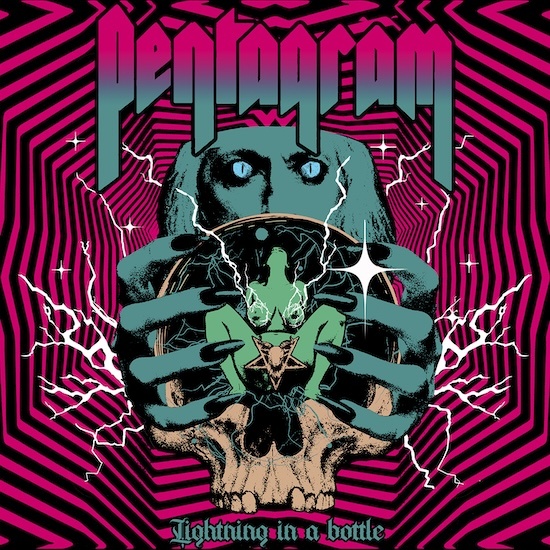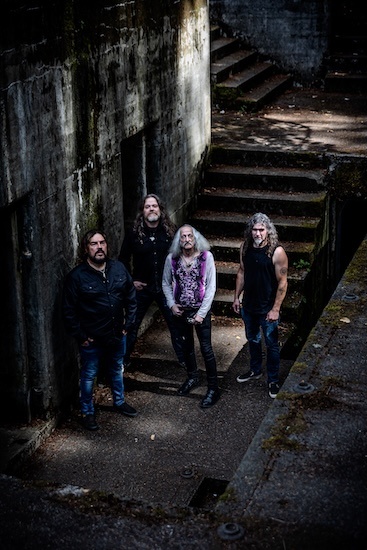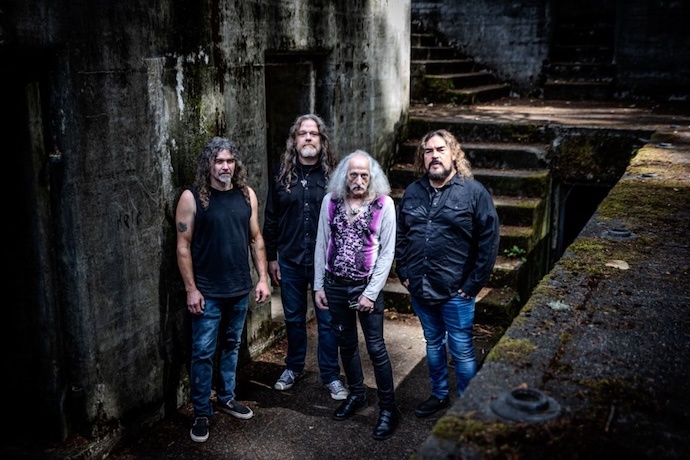
(At the end of January the US doom metal legends Pentagram, in collaboration with Heavy Psych Sounds, returned with their first new studio album in a decade. Not long before it was released, our Comrade Aleks reached out and then conducted the following very good interview with current Pentagram guitarist and sound producer Tony Reed, who also leads Mos Generator and Hot Spring Water. With thanks to Tony Reed, we present that interview today.)
The first incarnation of doom metal legend Pentagram was founded in 1971. Back then Bobby Liebling (vocals) gathered around himself a bunch of like-minded persons who dug heavy bluesy rock and wanted to do their own things. The band had a reputation of “street Black Sabbath”, and a lot of talented musicians went through its ranks.
Almost all of Pentagram‘s rises and falls were the result of Bobby’s actions, and it’s a miracle that after so many years the band is still alive. Nearly 40 musicians went through the band, and nowadays Bobby is accompanied by the guitarist and sound producer Tony Reed of Mos Generator, his colleague bass-player Scooter Haslip, and drummer Henry Vasquez from Saint Vitus, Legions of Doom, and more.
At the time of this interview Heavy Psych Sounds was scheduled to release the new Pentagram album Lightning in a Bottle on January 31st. It’s the tenth album in the band’s extended career (and the first one in this decade), and it’s an absolute killer, something I couldn’t ignore. Tony Reed was kind enough to find some free time in his busy schedule and helped with this interview.

Hi Tony! Thank you very much for your time, it’s much appreciated! How are you? How much place does Pentagram take in your busy schedule?
Between Mos Generator, Hot Spring Water, Big Scenic Nowhere and a few other recording projects, plus my work as a recording engineer and producer, Pentagram is keeping me the most busy at the moment as far as playing live goes.
What was your first encounter with Pentagram? What drew your attention to their music?
I would say around 25 years ago a friend of mine had lent me the Human Hurricane CD knowing that I would like it. He was right. I was a fan immediately and started searching out other releases.
In 2024, you remastered two of Pentagram’s albums with the most difficult fate – Review Your Choices and Sub-Basement. What kind of changes did you aim to reach during this work? Were you and Bobby satisfied in the end?
These were not easy jobs. I had to do the work using poorly mastered CD versions for my source material. The biggest change I made was the equalizing across the different songs. They were very uneven and needed to have the same sonic qualities throughout the album. After that I transferred the audio to a quarter-inch 2 track mastering deck to get some analog warmth in the bottom end and round off the digital high frequencies. Everybody involved seemed to be pleased with the outcome.
Did you communicate with Joe Hasselvander during or after this process? If I remember correctly, he produced both of these albums.
I have never had any communication with him.
You produced and mastered some of Saint Vitus’ albums since 2012, and this band is very close to Pentagram – both by status and genre. Did this experience help you with Review Your Choices and Sub-Basement?
I’ve been working in the heavy rock genre for many years so I am in tune with what kind of work needs to be done with these kinds of projects. I do believe that my work with Saint Vitus brought me more attention as a mixing/mastering engineer though.

How do you see Lightning in a Bottle as a sound producer? What kind of goals did you set before yourself when you started to work with the album’s sound?
The album was written very quickly and most of the drum tracks are from the demos that Henry and I did in the two writing sessions we did for the album. I would have preferred to take longer to write the album but sometimes that spontaneity is what gives an album the energy it needs. I think it turned out good considering the circumstances.
And yes, it did! I bet that everyone was surprised when you and Scooter Haslip joined Bobby. How did you get the invitation to take part in the recording of Lightning in a Bottle? How long did you think before you agreed?
Henry was the one that orchestrated getting Scooter and I in the band. Henry and I had already been waiting to find the right time to join and that is how we already had some songs written. It took me a few days to give my final decision. I’m very busy with music all the time so I didn’t want to get into something that would take away too much time from my main bands.
Can you tell us on what kind of terms you joined the relaunch? I mean, you have a huge amount of work to do at the studio, and you have your bands as well. So did you agree only to record an album or did you discuss a tour or series of gigs from the very beginning? Again, Review Your Choices and Sub-Basement were albums almost forced by Black Widow Records.
The first priority was to get the record written and recorded. When we were in the studio working on that, the announcements for European dates were posted. I’m pretty sure that touring was agreed on as long as it didn’t take too much time away from my main bands.
Did Bobby easily accept your plan? Did he have other musicians on his mind? Like getting twin guitars or something?
When Henry mentioned bringing Scooter and I into the band Bobby did some research on Mos Generator and Stone Axe and after listening to those bands he knew we could fit into the band easily. No other musicians were ever discussed.
Was the album a collaborative effort indeed? Or did Bobby just dig out a few more hits from his old notes and voila – one more album with a classical vibe?
Henry and I wrote the whole album with the exception of “I’ll Certainly See You in Hell”, which was an old Pentagram song from the seventies, and “I Spoke to Death”, which is a Mos Generator song that Bobby wanted to do. I was in charge of the music arrangement while Bobby and Henry worked the vocal melodies and lyrics. It was a very collaborative situation.
How do you see Pentagram’s role in the U.S. metal history? The band was always there, but most of the time it just went under radars until some, let’s say, events. And do you feel like you helped to keep this legend alive? Like, did you make Pentagram great again?
I think Pentagram are one of the most important bands of American hard rock. If they would have had more success in the seventies, I believe the landscape of hard rock and metal today would be a bit different in some ways. I think they would have had a major impact. As far as keeping the legend alive I would say that it’s very important for me to help keep this legacy in the hearts and minds of the fans. Past and future.
Tony, you’re an extremely prolific artist with a lot of ideas and an in-depth view on the music you compose and perform. How difficult was it to become a part of the band with this kind of history, with a formed style and so on? Did you struggle to fit in Pentagram’s style in a wider sense of the word?
Because I am prolific and I write in many styles, and I am a fan of the band, I found it fairly easy to fit in. I still haven’t found a comfortable area on stage but it’s getting better. We haven’t played enough shows to all gel together as a musical entity but it is getting better quickly.
I used to hear from artists that they don’t care which genre they play. Most of the time considering it as all “metal”. I read your interview (to Sleeping Shaman, probably) where you said how stoner is underestimated, and how it’s complex in itself. How do you see Pentagram’s music from this “scientific” angle?
Most of the Pentagram music is fairly straight-forward and easy to play but inside of the music are the nuances that come from very creative and talented musicians. That is the hard part to capture and still be true to your own style.

Some people tend to mix traditional doom metal and stoner, some people (bands especially) tend to say that it’s a crime to match both genres. What’s your opinion? Where would you draw the line between doom and stoner?
I don’t really know what those genre names mean. When I play music in a heavier style I just call it Heavy Rock.
Yes, how often did you catch yourself that a song you wrote for Lightning in a Bottle would better suit Mos Generator? Like, as mentioned above, “I Spoke to Death”?
I would have to say never. Other than how the songs are arranged, I don’t think there are any on Lightning that sit in the Mos Generator style. Especially in the style I’m writing in Mos Generator over the last few albums. It has moved away from traditional heavy rock into more alternative and progressive rock with a hard rock foundation.
I read that at the very beginning of the recording session you had almost 20 songs or so. Was it difficult to pick up the right ones for the album?
Henry and I wrote 18 or 19 songs and sent them to Bobby. Then he picked the ones he liked.
Did he offer some changes which would fit Pentagram better from his point of view? What kind of demands did you meet?
Not in the music. Only in the vocal delivery.
What about leftover tracks? May we expect an EP or some smaller release soon?
There are some unfinished songs that could see the light someday.
Back in 2024 Bobby mentioned that you’re going to do “several one-week things on the road in the States” and “maybe a few fly-ins just for weekends for the big festivals in Europe”. So what’s your current tour schedule in the end?
Right now (mid-January) we have west coast United States in February, South America in March, east coast United States in May, and Europe in June/July.
Very busy schedule! Thanks again for finding time to answer! What kind of set list do you rehearse for the tour?
It’s a pretty even mix between seventies and eighties material and stuff from the new album. We have only rehearsed a few times. We all live very far apart from each other so it’s not easy to get together.
The special attention that is paid to the band’s gigs in Europe, and the Old World, seemed to be more supportive of such traditional doom bands like Pentagram even in the ’90s, when grunge and alternative metal / rock changed the rules of the game. How do you think about why Pentagram and music like you play are more popular in Europe?
In general, European crowds are better than U.S. audiences and still hold on to bands that have faded or never became popular in the States. I think support of music and the arts is built into the culture of Europe and encouraged. That is not so much the case in the states.
It’s the first Pentagram release for ten years, do you feel that people were waiting for it throughout all of this period? Did you get some direct feedback from fans?
The response from the singles has been great. I think this album is more diverse than past releases and has more character from each player. It has dynamics and nuance and that is important to keep the listener engaged.

What’s new in the Mos Generator’s camp? What do you prepare for the band’s fun this year?
We just finished demos for the next record and I will look for a new label to release it when it’s properly recorded. Like usual, we have taken a different direction by adding new textures to the heavy rock foundation we root ourselves in. This album is very rhythmic and aggressive but with catchy vocals and dark lyrical content. There is a real underground eighties/nineties feel to it.
I also just finished an album with my southern rock / power pop band Hot Spring Water. This will be our fourth album and it’s due out on my record label in April.
My congratulations! Do you plan to play live with Hot Spring Water as often as with Pentagram?
Hot Spring Water plays regularly but there is really no touring. It is mostly regional shows. As mentioned, we just finished our 4th album so we’ll try and do more traveling once that is out in April.
By the way, did you ever think to combine the gigs of Pentagram and Mos Generator? Would it be too exhausting?
We talked about having Mos Generator open but I didn’t think it was a good idea. I don’t think it would be too exhausting on stage, it would just be exhausting to road manage MG while also traveling with Pentagram.
And what are your further plans with Pentagram for 2025?
Tour in support of Lightning In A Bottle.
Thank you very much for the interview, Tony. Did we forget something important?
I think we got everything. Thank you for your interest in me and the music I make. I truly appreciate it.
https://www.heavypsychsounds.com/shop.htm#HPS328
https://heavypsychsoundsrecords.bandcamp.com/album/pentagram-lightning-in-a-bottle
